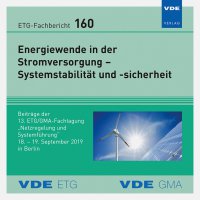Comparison of Extended Current Control and Virtual Synchronous Machine
Conference: Energiewende in der Stromversorgung – Systemstabilität und -sicherheit - 13. ETG/GMA-Fachtagung Netzregelung und Systemführung
09/18/2019 - 09/19/2019 at Berlin, Deutschland
Proceedings: Energiewende in der Stromversorgung – Systemstabilität und -sicherheit
Pages: 6Language: englishTyp: PDF
Personal VDE Members are entitled to a 10% discount on this title
Authors:
Duckwitz, Daniel (Fraunhofer IEE, Germany & Universität Kassel, Germany)
Fischer, Boris; Shan, Martin (Fraunhofer IEE, Germany)
Abstract:
With increasing shares of renewable, inverter-based power generation, system inertia declines. Additional inertia is required to ensure system stability. Grid-forming inverter-based plants are suitable to provide it. Potentially suitable inverter control schemes need to be evaluated regarding their performance in critical system splits. This paper compares two gridforming control schemes with inertia emulation: Extended Current Control (ECC) and Virtual Synchronous Machine Control (VSM). ECC is an extension of state-of-the-art current control structure. Hence, the effort for implementation appears as low. However, the selection of suitable control parameters is a complex task. In operation, undesired transient deviations of frequency and voltage occur. The grid-forming property of ECC has been confirmed for the first time. In contrast, implementing VSM means replacing the complete controller structure. A robust result is achievable with little design effort. Undesired transient deviations do not occur.


